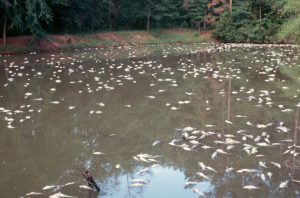Most of the pond calls we receive in the Extension office refer to fish kills, weeds, and fertilization. Sometimes all are related. Weeds are annoying, so everyone wants a clean pond to fish. We need to be careful though and not forget about our fish when we treat the ponds. We are here to help prevent fish kills and help you understand your pond. Please call us before you treat your pond for weeds or fertilize. We can help you protect your fish by advising you to use the correct rates as well as the proper way to apply herbicides. Rates and methods are very important in protecting your fish.
Why fertilize? Proper fertilization and liming help maximize fish production in ponds.
For more information on Fertilization and Liming, visit: https://extension.uga.edu/publications/files/pdf/B%20867_2.PDF
Fish ponds may experience a loss of oxygen at any time of the year, depending on the weather and amount of nutrient enrichment the pond has received; however, most oxygen depletions occur in warm weather and usually follow a period of cloudy, overcast conditions. Low oxygen concentration in pond water means stress and possibly death for the pond fish. When fish die from low oxygen, there can be serious financial consequences for commercial fish operations; for example, largemouth bass, bream and grass carp can be worth more than $3,000.00 per acre. Therefore, pond owners should consider a plan to provide aeration for their ponds before oxygen depletions occur.
For more information on how you can protect your fish, read our publication: https://extension.uga.edu/publications/files/pdf/C%201048_1.PDF
